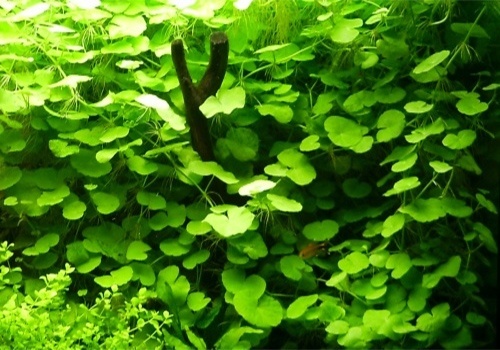Hydrocotyle Leucocephala - pot
> Upright or floating, vine-like stems
> Light green, roundish leaves
> Not demanding
A time-tested, popular, easy aquarium plant from Tropical South America. In the submerged form the plant grows upright or floating. It has light-green, roundish leaves.
Hydrocotyle leucocephala, Brazilian pennywort, is native to wet and boggy areas in Central and South America. It is very easy in cultivation, which makes it an optimal aquarium plant that has been around in the hobby for a very long time.
The leaves of H. leucocephala are roundish and grow on a tendril-like stem. This pennywort is one of the easiest aquarium plants and can be recommended to beginning aquarium keepers without any reservation. It does well in almost any water parameters and doesn't have high requirements regarding lighting and CO2 concentration. Even high temperatures are not really a problem, which makes it a great candidate for planted Discus tanks.
Its leaves turning yellow at the edges are a sure sign of iron deficiency, which can easily be remedied by adding an iron fertiliser to the water, though. Even though it does well under not-quite-ok conditions, it displays its full potential under sufficient light, CO2 injection and a good nutrient supply. It can be cultivated emersed, too; the creeping land form grows especially strongly and produces a large number of shoots you can make cuttings of.
An interesting fact is that H. leucocephala is actually an edible plant. Its leaves taste a bit peppery and are used as spice in several countries, or even as basis for a lemonade.
Propagation is easy, as the plant throws many lateral shoots that can simply be cut off and re-planted in the substrate.
Hydrocotyle leucocephala is a highly versatile plant that lends itself readily for accentuating driftwood or middleground plants due to its tendril-like growth. It can also be used as vertically growing stem plant or float on the surface. It goes well with almost any other plant, however, it is an especially good companion plant for Anubias species as it has comparable requirements and contrasts nicely against their dark green hues.







